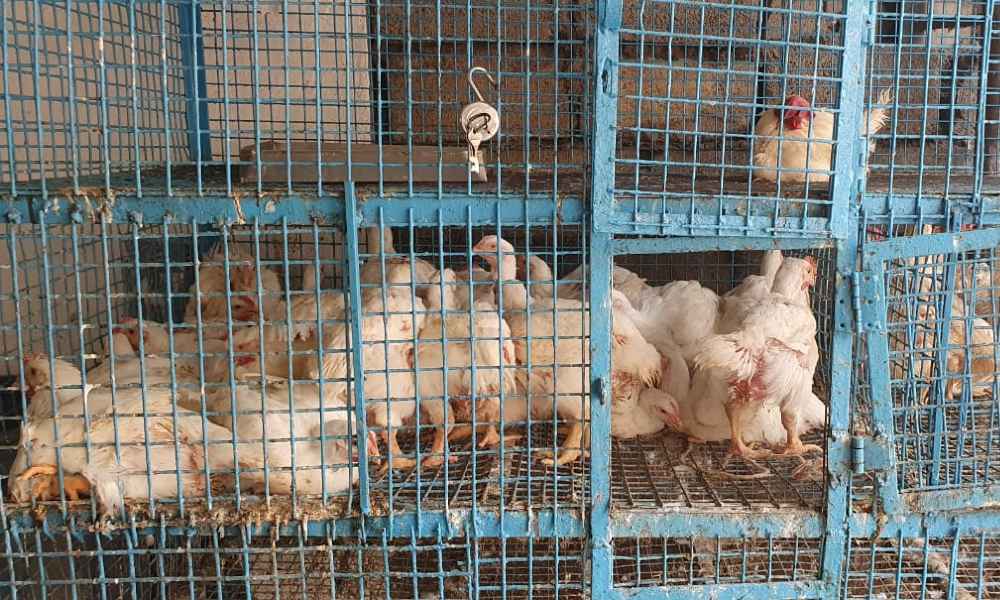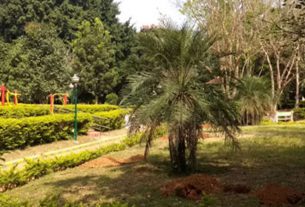Poultry farming in Karnataka is expected to face losses with a predicted increase in heat waves in the state.
Poultry farmers in the state are reducing production of chickens as they’re worried about more chickens dying due to the heat wave. This has led to an increase in the price of chicken.
Vijay, a poultry farmer, said, “I have a small farm in K.Golahalli, with 200 broiler chickens. Since the summer started, things have been tough. The heat wave is making the chickens sick, and about 10 to 12 of them are falling sick every day.”
Many news reports and weather reports show that Karnataka has recorded a maximum temperature of 35 to 37 degree Celsius in April.
Faizan, a poultry shop owner in Shivanjinagar, said he has 2000 broiler chickens and the eggs produced daily has come down by 10 to 15 percent. “The chickens are not eating enough food and if this situation continues, production may fall further,” he said.
He added, “I installed 15 fans to save the chickens from heat. However, due to persistent load-shedding, it has become difficult to use them. In the last week, more than 50 chickens died of heatstroke in my shed.”
H.N. Raja Shekhar, treasurer of Karnataka Poultry Farmers and Breeders’ Association, said, “The price for live birds in Karnataka is around Rs. 130 to Rs. 145 per kg. However, the price has gone up to Rs. 175 recently. This increase is because farmers are raising fewer birds due to the hot weather.”
He added that many poultry farms have facilities like fans and air-conditioners to prevent deaths during heat waves, but not all can afford it. Those equipped with these facilities maintain consistent production and exploit the situation by raising prices. “Meanwhile, farms with lower production also increase prices for survival. Ultimately, this impacts the customer,” he said.
Shopkeepers and restaurant owners said that while price surge is an annual trend, this year’s increase is slightly sharper. A kilogram of chicken, which used to cost Rs. 230 to Rs. 250 until February, is now retailing between Rs. 280 and Rs. 350, depending on location and shops.
Ahmed, who runs a kebab stall, said that all he can do is to wait for the prices to come down. “We cannot increase the price on the menu as it will lead to opposition from customers. Our per-day expenditure on chicken has doubled due to the price surge.”
Animal Husbandry Department officials stated that there have been no reports of mass chicken deaths anywhere. Dr. N. Somashekhar, Joint Director (Livestock Health), said, “There is no need to worry. So far, we haven’t seen a lot of chickens dying all at once in one place. However, we know that chickens and other birds struggle in the heat. High temperatures can cause chickens to die. We’ve given advice to be careful and to remove any dead chickens.”
Studies show that high rise in temperatures negatively affects poultry farming. “Heat stress negatively affects the welfare and productivity of broilers and laying hens. The detrimental effects of heat stress in poultry ranges from reduced growth and egg production to decreased poultry and egg quality and safety. Understanding and controlling heat stress in poultry is crucial to successful poultry production and welfare. Ideal temperature for poultry rearing is 18 to 28 degrees Celsius and temperature above which heat stress starts is 30-degree Celsius,” the study stated.
This year, Bangalore is facing a severe heat wave with temperatures reaching up to 37.2 degrees Celsius, which is higher than usual. This is because of the El Nino phenomenon and global warming. With the weather getting warmer, poultry are suffering from heat stress, also known as summer stress. This happens when the body can’t balance heat properly, leading to poor performance, lower production, and more deaths among birds. Poultry farmers need to take extra care to protect their birds from the heat.
Experts advise farmers to cover the roofs of the sheds with leaves and sprinkle water on the leaves to control the heat.
Dr. Dhirendra Kumar, poultry consultant in Bangalore, suggested ensuring adequate ventilation in the sheds, keeping fewer chickens within a shed, and not adding vitamin supplements to their water. He said, “Placing wet jute mats on the sheds and watering them regularly, and not feeding the chickens at noon will also help.”
Studies also show that poultry farmers in the coastal and the northern districts of the state are prone to suffer from rising heat. As a result, the chicken prices are expected to go very high.




